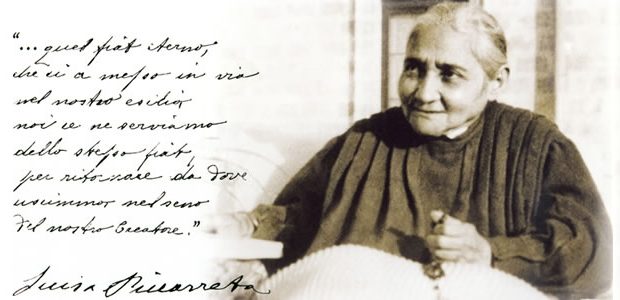11/17/2016

For several days, the Vatican Publishing House has published The New Mysticism Dictionary edited by Fr Luigi Borriello, Fr. Edmondo Caruana, Prof. Maria Rosaria Del Genio and F. Raffaele Di Muro. After seeing the editors, flicking through its 2246 pages we weren’t surprised to find even the entry Luisa Piccarreta (p.1266).
The book which collects more than 800 items written by 257 Italian and foreign scholars, has a global scope, it is not addressed only to professionals. Certainly, with this newness, the academic and scientific world considers Luisa as an authoritative witness of mysticism and talks about her by outlining, in short, her biographical features and spirituality.
In presenting the dictionary, the publishing house itself comments that “The Christian mysticism, in the strict sense of the word, is by its very nature, the awareness of the mystery of God revealed in Christ. The mystics are the channels through which the fragments of this Mystery pass and reach the existence of the people of all times. (…) In this work we speak of mysticism as a passive gift of conscious, continuous, and dynamic union with God the Father, God the Son and God the Holy Spirit who is love. “
Luisa can be known in two respects. The first aspect is linked to the mystical phenomena that we can find in the biographical data, external data we would say, and the other is linked to the real mystical life, which emerges in her rich Diary that gives us a more intimate view.
As regards the first, Luisa is among the “emblematic figures of the mystical life” along with Francis of Assisi, Teresa of Avila, Joseph of Copertino, Padre Pio of Pietrelcina and Natuzza Evolo as it appears in the Dictionary of Christian mystical Phenomena by Fr. Luigi Borriello and Fr. Raffaele Di Muro (Ancora publishing house 2014 p. 166-174). In her life several mystical phenomena appear and they are documented in the historical testimonies and described in her writings such as the breastfeeding, change of heart, invisible stigmata, the swoon that Luisa called “the usual state”, ecstasies, mystic marriage, regurgitation after taking meals and so many others. This is the visible participation of her person to the humanity of Christ.
The other aspect, that we could define more internal, is however linked to the long path that the Lord with His revelations enabled her to do in understanding and in the life of the Divine Will. This was as the soul of Luisa, her own life and so all that was expressed not so much with a mystical phenomenon but in the ordinariness of everyday life. Only under this aspect, her life might be, in some way, a luminous trail for our existence that winds through work, family commitments of all kinds.
The mystical phenomena that Luisa lived, are however important to understand how the Lord shaped and prepared her to receive the gift of “living in the Divine Will of Jesus.” They also represent the continuation of the path of the saints in the Church’s life. Of course, this continuity is a judgment that, truly and solemnly can only be given by the Holy Father at the conclusion of the process for the Beatification and Canonization. But, on this journey, the general sentiments of many contemporaries of Luisa and of faithful of every latitude in our times are very important..
If we read these two aspects of the mystical experience of Luisa with wisdom, we can understand how the Lord wanted to make in Luisa as a bridge between old and new, or perhaps we should say, He wanted make Luisa the” disciple of the kingdom of heaven “who brings out of his treasure what is new and what is old.” (Mt 13:52).
For this reason we can never compare “Luisa of the Will” Divine with the other saints, almost in a completion for exclusion. Her whole life, instead, shows us that in her a mercy project comes to bloom, a project with which the human creature and all creatures recover possession of the place for which God created them.
As regards the dictionary, then, we realize that, rightly, the presence of Luisa’s testimony is of great value. We can’t but share what Alessandra Turco says on the online La Stampa newspaper presenting the book, “The New Dictionary is faithful to the content of the Christian tradition and is open to the current needs of every man.
It satisfies the quest for origins by man and, at the same time, wants to lead him to a more authentic and profound quality of life (…) The work is intended for everybody: theologians, scholars of religious studies, experts and not on mysticism and to all those concerned in the discovery of the meaning of their own existence and in the response to the plan of God, who wants man to immerse conscientiously in the dynamic of the life of the Trinity. “
